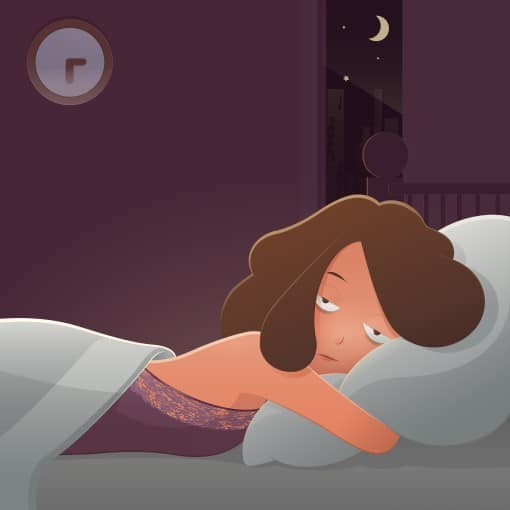
Will snoring stop after pregnancy? – What we know and 5 things you can do
By Jason Wooden, PhD | March 4, 2020
One in four women snore during pregnancy due to hormonal changes and other risk factors. Research has shown that snoring will stop for some moms after birth but can linger as long as 6 to 8 months for others.
Untreated snoring can take a toll on your health and strain relationships. Your options to deal with it include sleep hygiene, positional therapy, weight loss, and other sleep apnea treatments.
In this article we’ll talk about:
Check an online baby forum and you’ll find moms asking whether their snoring will stop after the baby comes.
It’s a hot topic on other popular forums with people wondering why they’re still snoring months after the birth of a child.
I’m assuming your snoring started after you got pregnant which isn’t all that common.
Obstructive sleep apnea is the most common cause of snoring. Based on past studies, it can be found in as many as one in four moms by late pregnancy.
For sure, snoring can a nuisance for a bedmate and anyone else nearby, but it’s also bad for you.
It can take a huge toll on both your physical and mental health.
And let’s not forget the connection between poor sleep and depression.
Let’s take a look at why you started snoring in the first place and what the research says can happen after birth.
We’ll also discuss some practical things you can do if you find that you’re still snoring after pregnancy.
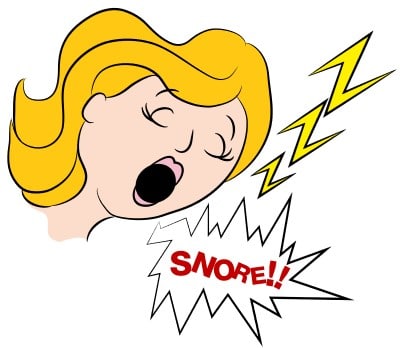
Why moms snore during pregnancy
Pregnancy is one of the known risk factors for obstructive sleep apnea, a sleep disorder that affects over 18 million people in the US and almost 1 billion worldwide.
Commonly, throat muscles and tissues block the airway during sleep due to collapse or other reasons.
The result is repeated breathing interruptions throughout night.
Loud snoring is one of the most common symtoms of obstructive sleep apnea.
Making things worse, as the body and brain become oxygen deprived you fall out of restorative deep sleep into a lighter sleep. When you wake up in the morning, you feel as if you haven’t sleep at all.
So, this is what happens and generally pregnant women are likely to get sleep apnea.
But why?
Hormonal changes are believed to be the main culprit.
During pregnancy, estrogen and progesterone levels ratchet up in preparation for the arrival of the baby.
Unfortunately, this can also lead to fluid retention in the body. We’re all aware of the swollen ankles during the day, but at night all that fluid can lead to swollen tissues that can congest the airway and cause snoring.
Those hormones can also affect throat muscles causing the upper airway to relax too much which can cause sleep apnea snoring.
Do you have any of these obstructive sleep apnea risk factors?
- Excess weight
- Large neck size
- Large tonsils
- Alcohol consumption at bedtime
- Pregnancy
- Hypertension
- Middle age
- Family history of OSA or snoring
For some moms, excessive weight might also be involved. Too much weight gain can lead to extra tissue in the neck which can aggravate snoring.
And if you were overweight before pregnancy, you were already at increased risk for obstructive sleep apnea.

Will my snoring stop after pregnancy?
Now we come to the real question – will your snoring go away and your nights get better after the baby comes?
Here’s some of what we know…
In one study involving 50 pregnant moms and 100 nonpregnant women, researchers in Scotland measured their airways and tracked their symptoms.
They found that the pregnant moms did have smaller airways than the non-pregnant women. While over half the moms snored during pregnancy, fewer snored after delivery.
More recently, US researchers tracked the sleep of 65 moms and found that obstructive sleep apnea is common early post-partum and may linger at least 6 months.
In the study, over a third of the moms still had sleep apnea symptoms after birth and some retested 6 to 8 months later still had sleep apnea.
What this all suggest is that there is a chance that your sleep apnea snoring could linger on after pregnancy.
Why this happens is not as well-studied but it’s possible other risk factors are to blame.
If your weight remains excessive, it could aggravate sleep apnea snoring.
Also, other things such as nose and throat inflammation during the allergy season may also prolong sleep apnea symptoms such as snoring.

There’s more at stake than you think if you’re still snoring after the baby comes
Okay, if you find you’re one of those moms who still snore after the baby has arrived, there may be more at stake then you realize.
We’ve already talked about how snoring is a common symptom of obstructive sleep apnea.
Untreated sleep apnea can really wreck your life.
It can turn you into a sleep-deprived zombie…
You’ll find it hard to focus on the everyday things…
It can increase your risk for diabetes, heart disease, and dementia…
It’s also been linked to anxiety and depression. In fact, in studies poor sleep has been connected to depression in moms.
None of this is good for a mom or a relationship.
And if both you and the father are sleep-deprived from your snoring, you may be dealing with double trouble. Sleep-deprived people don’t think too clearly and have a hard time coping.
It’s hard enough having your sleep interrupted if you’re getting up during the night to nurse a baby.
With untreated sleep apnea, you could be dealing with misery on steroids.
So, it’s really important to do something if you’re still snoring after the baby comes.
Sleep apnea symptoms:
- Pauses in breathing while asleep
- Choking, gasping, or snorting sounds
- Loud snoring (not all people who snore have sleep apnea)
- Dry mouth or sore throat
- Difficulty staying asleep
- Waking up frequently to urinate
- Morning headaches
- Fatigue during the day
- Excessive daytime sleepiness
- Irritability or mood swings
- Attention, memory, or learning problems

What you can do about post-pregnancy snoring
Now we get to the good news if you’re in the post-pregnancy snoring club.
There’s actually quite a bit you can do to improve your sleep and make life better for everyone.
You should first start with sleep hygiene, the everyday things you do that set the stage for restful nights.
(And yes, what you do during the day can have a big impact on what happens at night.)
It focuses on things like avoiding naps and your evening routine. Bad sleep hygiene can sabotage other things you’re doing to deal with your sleep issues.
Sleep hygiene tips
- Keep consistent wake up and sleep times
- Avoid naps
- Exercise during the day
- Avoid large meals, alcohol, or stimulants such as caffeine before bedtime
- Maintain a bedtime routine to wind down
- Avoid using TVs, laptops, or other electronics before sleep
- Keep your sleep environment dark, cool, quiet, and relaxing
You may need a face mask to block out excessive night time lighting. Is your bedroom in the optimal range of 60 to 67 degrees Fahrenheit that experts recommend?
Are you using electronics in the bedroom at night? TVs, tablets, and smart phone emit bright blue light which can confuse your natural sleep-wake cycle and leave you wide awake.
Here’s what else besides sleep hygiene you can do:

1) Try sleeping on your side:
Over half of obstructive sleep apnea cases are due to sleep position. Sleeping on your side or stomach can help keep your airway more open.
If you’re not a natural side sleeper, there’s now positional therapy devices designed to help retrain your body.
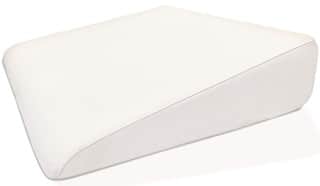
2) Try sleeping upright:
Recent research suggests that elevating your head may help improve sleep apnea symptoms.
Depending on your sleep apnea type, symptom severity, and other factors, there are different ways you can do this – sleeping in a recliner, wedge pillows, and adjustable beds.

3) Try weight loss:
As mentioned earlier, excessive weight has been linked to sleep apnea. Studies have shown weight loss can help improve symptoms and, in some cases, eliminate the need for long-term CPAP therapy.
Experts say that losing 10% of your weight can lead to a 20% improvement in OSA symptoms.
Learn more:
How weight loss can improve sleep apnea
Healthy weight loss tips
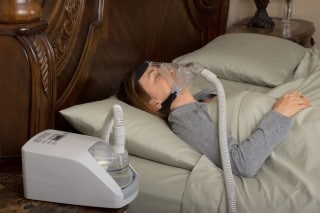
4) Get a sleep apnea treatment:
A sleep specialist can help you get diagnosed and find a sleep apnea treatment that works for your situation.
Turned off by the idea of wearing a CPAP mask? Don’t worry, there are now plenty of options to try.
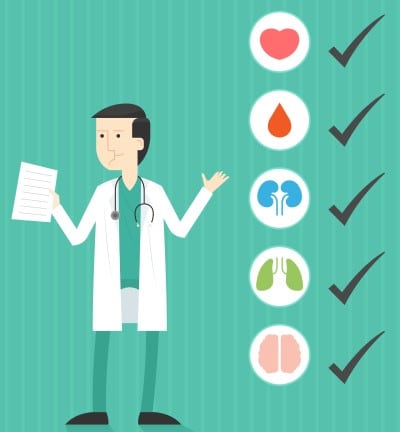
5) Check for other causes:
Asthma, allergies, acid reflux, chronic pain, diabetes…what do they have in common?
They can all wreck sleep.
In fact, many health conditions can cause problems for sleep. Many prescription drugs can also cause problems.
That makes it important to see a doctor to check for other things that could be worsening your sleep. Sleep hygiene by itself won’t resolve these underlying issues.
3 things to remember about snoring after pregnancy:
- Many moms snore during pregnancy
- Research suggests that snoring can linger after birth
- If it continues, it’s important to take it seriously and get treated
You may also be interested in:
The latest sleep apnea treatments
How to get more restful nights if you’re sleeping with someone with sleep apnea
Practical tips for survival if sleep apnea is ruining your marriage
The Ultimate guide to treating sleep apnea without insurance
Can snoring cause a nose bleed?
Sources:
1. Management of Obstructive Sleep Apnea in Pregnancy, Obstet Gynecol Clin North Am. 2018 Jun;45(2):233-247
2. “Sleep Apnea”, National Sleep Foundation website
3. Estimation of the global prevalence and burden of obstructive sleep apnoea: a literature-based analysis. Lancet Respir Med. 2019 Aug;7(8):687-698.
4. “Snoring, Sleep Apnea and Pregnancy”, Alaska Sleep Clinic website
5. High risk for obstructive sleep apnea and other sleep disorders among overweight and obese pregnant women. BMC Pregnancy and Childbirth Volume 15, Article number: 198 (2015).
6. Sleep-disordered breathing and upper airway size in pregnancy and post-partum. European Respiratory Journal 2006 27: 321-327.
7. Gestational Obstructive Sleep Apnea: Biomarker Screening Models and Lack of Postpartum Resolution. J Clin Sleep Med. 2018 Apr 15; 14(4): 549–555.
8. High risk for obstructive sleep apnea and other sleep disorders among overweight and obese pregnant women. BMC Pregnancy and Childbirth Volume 15, Article number: 198 (2015)
9. “Allergies and Sleep”, National Sleep Foundation website
10. Sleep and Depression in Postpartum Women: A Population-Based Study. Sleep. 2009 Jul 1; 32(7): 847–855.
11. Weight loss for obstructive sleep apnea: the optimal therapy for obese patients. J Am Diet Assoc. 1994 Nov;94(11):1291-5.
Connect with us:
About Us
Better Sleep Simplified® was founded as a place for you to get clear and well-researched information.
Our goal is to make sure you know about your options so that you take action sooner rather than later.
Check us out on YouTube:
Watch and Learn
Helpful sleep tips, interesting sleep facts and statistics you want to know about
Affiliate Disclosure
This site is a participant in the Amazon Services LLC Associates Program and other affiliate advertising programs designed to provide a means for sites to earn advertising fees by advertising and linking to them.
Important: BetterSleepSimplified.com is for informational purposes only and is not intended or implied to be a substitute for professional medical advice, diagnosis, or treatment. Always consult a physician for sleep and health concerns. See additional information.
